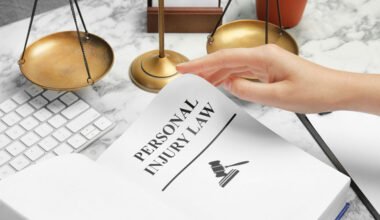Have you ever felt the rush of panic after a car accident, unsure what to do next? One moment you’re driving home, and the next, you’re facing injuries, confusion, and a swirl of questions about your rights.
Many people feel lost when dealing with insurance companies and legal steps after a crash. The good news is, you don’t have to face it alone.
This article will guide you through the process of filing a legal claim after a car injury accident with clarity and confidence.
Seek Immediate Medical Attention
After a car injury accident, your health should be the first concern. Even if your injuries seem minor, see a doctor to rule out hidden trauma. Medical records also create proof that your injuries came from the accident.
Delaying medical care can weaken your legal claim. Insurance companies may argue that your injuries were not serious or not caused by the crash. Quick treatment ensures you have solid evidence to support your case.
Follow your doctor’s orders carefully and attend all follow-up visits. Keep records of every appointment, prescription, and expense. These details will be valuable when calculating compensation later.
Report the Accident to the Authorities
Filing a police report is essential after any car accident. The police will document the scene, interview witnesses, and note who might be at fault. This official report serves as a foundation for your legal claim.
Without a report, it can be harder to prove what really happened. Memories fade, and verbal statements may not hold weight in court. The report stands as an objective record that supports your version of events.
Request a copy of the report once it is ready. Review it for accuracy and keep it with your other case documents. If any details are incorrect, notify the police department right away.
Gather Evidence and Documentation
Collecting evidence begins at the accident scene. Take photos of the vehicles, road conditions, and visible injuries. If possible, gather witness names and contact information before they leave.
Keep all paperwork connected to the accident. This includes repair bills, towing receipts, medical reports, and communication with insurance companies. The more complete your records, the stronger your case becomes.
Organize everything in a secure folder or digital file. Label documents by date and category for easy access later. Being prepared helps your lawyer build a clear and convincing argument.
Notify Your Insurance Company
Report the accident to your insurer as soon as possible. Most policies require quick notice, and delay may affect your coverage. Provide honest details about the crash, but avoid guessing about fault or injuries.
Your insurance company will open a claim and may send an adjuster to inspect the damage. Stay polite but cautious during these discussions. You can decline to give a recorded statement until you speak with your lawyer.
Keep copies of all communication with your insurer. Written records help prevent misunderstandings about what was said. This documentation can also be used to challenge unfair settlement offers.
Consult a Personal Injury Lawyer
A personal injury lawyer understands how to navigate complex accident claims. They can explain your rights and evaluate whether you have a strong case. Legal advice early on prevents costly mistakes later.
Your lawyer will communicate with insurance companies on your behalf. They know how to handle tactics that aim to reduce your compensation. This allows you to focus on recovery while they manage the legal side.
Choose a lawyer with experience in car injury cases. Ask about fees, case history, and how they plan to approach your claim. For those in Washington, it may be wise to consider Spokane attorneys who specialize in helping accident victims seek fair compensation.
Focus on Recovery and Long-Term Wellbeing
While the legal process unfolds, remember that healing takes time. Physical recovery and mental health are just as important as financial compensation. Managing stress and following medical advice support both body and mind.
Stay consistent with treatment and checkups. Skipping care can slow recovery and may weaken your claim. Courts and insurers often view steady medical care as proof of genuine injury.
Lean on family, friends, or support groups during recovery. Emotional strength can make it easier to face legal and physical challenges. A balanced focus on health and justice leads to a stronger, more stable outcome.
Understand Deadlines and Legal Limits
Every state has a statute of limitations for car injury claims. This law sets a deadline for filing your case in court. Missing it can mean losing your right to compensation altogether.
Your lawyer will track these timelines and ensure paperwork is filed on time. They can also explain exceptions that might extend the limit in rare situations. Acting early gives your claim the best chance to succeed.
Deadlines also apply to insurance reporting and medical claims. Keep a timeline of when you submitted each document. Staying organized protects your rights and keeps your case moving forward.
Calculate Your Damages
Before filing a legal claim, it is important to know the full extent of your damages. This includes both economic losses, like medical bills and lost wages, and non-economic ones, like pain and suffering. A complete list helps ensure you seek fair compensation.
Keep detailed records of every expense linked to the accident. This can include therapy sessions, travel costs for medical visits, and repairs to your vehicle. Accurate numbers make your case stronger and harder for insurers to dispute.
Your lawyer can help estimate future losses as well. Ongoing treatments, reduced earning ability, or emotional distress can all impact your total compensation. Calculating everything early helps build a realistic and solid claim.
Turn Your Crash Into a Comeback
Recovering from a car injury accident takes more than time; it takes knowledge and persistence. The legal system can seem like a maze, but understanding your rights can turn uncertainty into control. Every step you take toward justice helps rebuild both your life and peace of mind.
You deserve fair treatment and full recovery. With the right guidance, you can move from chaos to closure.
We’re glad this article was of help. For more similar content, check out our blog.



